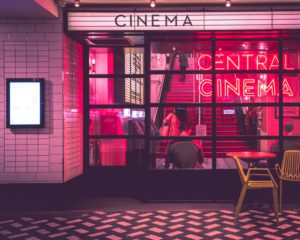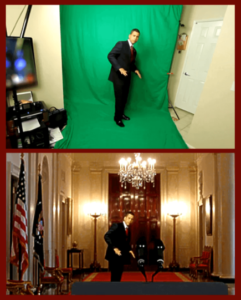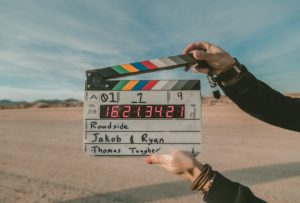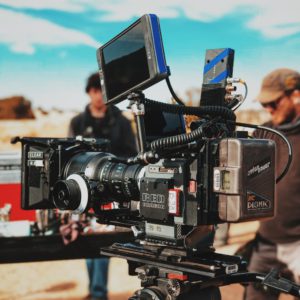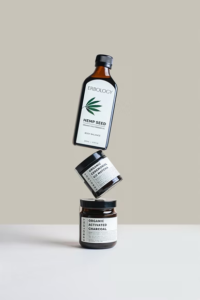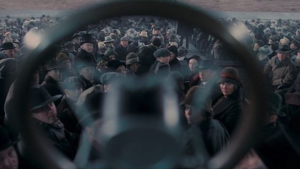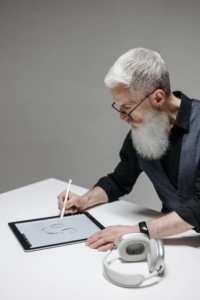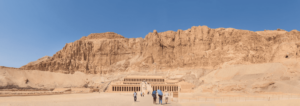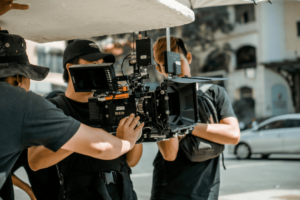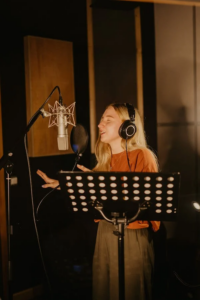A production designer is in charge of developing and implementing the visual concept of a theater, film, television, or other media production. They work closely with the producer and director to identify an appropriate design style for locations, sets, props, graphics, lighting, and costumes. They may accomplish this by creating conceptual models or drawing sketches. After deciding on the concept, they typically form and manage an art department, which consists of a design team and a construction team.
Production designers tend to specialize in theater, film, or television, but there may be some overlap. In theatrical productions, they’re often referred to as “set designers” or “stage designers.” Usually, they establish a strong partnership with a certain director, who they’ll work with on multiple projects.
Responsibilities of a Production Designer
Many production designers work on a freelance basis. As such, one of the most important aspects of their work is building a close network of contacts and marketing their skills, experience, and achievements. Their first tasks typically include providing a clear understanding of the brief and agreeing to a suitable timeframe and fee. After that, their responsibilities may include:
- Reading scripts to determine which visual style is most appropriate for the project
- Discussing concepts and production requirements with the producer and director
- Researching art, history, and other topics related to the production
- Developing design ideas and creating models or scale drawings of theater or studio sets
- Planning and keeping track of the design budget
- Providing ideas for props, special effects, graphics, costumes, wigs, and makeup
- Identifying and evaluating potential locations or studios
- Sourcing appropriate materials, objects, and other elements for the production
- Presenting ideas to other people involved in the production, including actors and camera operators
- Doing research and calculations to prepare a property list
- Creating and managing an art team
- Giving instructions to the set construction company, special effects specialists, and scenic artists as well as monitoring their work
- Collaborating with the director of photography, costume designer, and sound and lighting designers
- Offering advice on visual presentation during rehearsals, filming sessions, and progress meetings
- Checking locations and sets during filming to ensure all requirements are met
A production designer is a key collaborator in ensuring a film, television show, commercial, or other media project is the best it can be.
Working Hours of a Production Designer
Depending on the project, a production designer may have to work long hours. Their working hours typically vary depending on the production and may include working into the night or on weekends in addition to regular hours. They tend to be extremely busy when they’re in the middle of a contract, and as freelancers, they’re able to control their workloads by choosing which contracts to accept. The duration of contracts may also vary greatly depending on the nature and budget of the production.
What to Expect When Working as a Production Designer
The work of a production designer can be unpredictable, so you have to be able to adapt quickly to changing environments and circumstances. Being flexible is the key to a successful career in production design. The following are several things you have to be prepared for when working as a production designer:
- Employment can be insecure, so you have to consider times of inactivity when you’re planning your finances.
- The working environment can vary significantly. You may work in a film or television studio, theater workshop, design office, shooting location, or your home.
- Work usually takes place in cities or towns where there are theaters and studios. However, location work may require you to be away from home for weeks or months and at short notice.
How to Become a Production Designer
If you want to pursue a career as a production designer, you need to meet the following requirements:
Academic Qualifications
Production design is a field that requires extensive knowledge and skills in theater, film and television, or other media production. A degree or diploma in design is good training for a production designer because it enables you to build a portfolio to demonstrate your creativity, technical ability, and sense of spatial understanding. Examples of relevant fields include:
- Performing arts
- Drama or theater studies
- Creative or technical arts
- Production design
- Film, television, and media arts
- Fine art
- Visual art
- Theater design
- Graphic design
- Illustration
- 3D design
- Interior design
- Architecture
- Landscape architecture
You can often pursue these programs as an associate, bachelor’s, or master’s degree. If you want more focused education in production design, consider pursuing a specialist post-secondary diploma, degree, or certification.
If you are interested in becoming a production designer and building your skills applying to the Nashville Film Institute will give you experience you need for a career in the film industry.
It’s possible to become a production designer without a degree or diploma. However, in most cases, you’ll need to have an outstanding design portfolio or work your way up from craft level.
Skills
Besides academic qualifications, you also need certain skills and traits to go far in your career as a production designer. These skills include:
- Creativity
- Flair for producing original creative ideas
- Good understanding of the visual arts
- Ability to be resourceful and adaptable and to solve both practical and conceptual problems
- Communication
- Ability to communicate ideas through model-making and technical drawing
- Ability to work with others as part of a team, at all levels
- Persistence to follow up with potential employers and gain work
- Capability to manage a project from start to finish and meet tight deadlines
- Ability to work independently
- Film Experience
- Solid working knowledge of production processes
- Critical view of theater, television, and film
- Familiarity with the works of specific production designers
- Confidence and capability to form and supervise a design team
Work Experience
Similar to other professionals in creative industries, production designers face fierce competition. You can get a head start over other aspiring designers by:
- Joining relevant organizations or productions. Seek out theater, film, or music organizations, volunteering for local productions, or taking part-time production work. By doing so, you can work on productions and gain hands-on experience, build up your portfolio, and make valuable professional contacts.
- Taking part in media production or other art competitions. In some competitions, successful entrants will get the chance to work with reputable film, television, theatrical, opera, or dance production companies. Joining a competition may also allow you to exhibit your designs and models.
- Working as an assistant or apprentice. Some seasoned professionals in production design, filmmaking, theater, or other media fields may be willing to hire an assistant for certain projects. In the film industry, you can start gaining practical experience by becoming a runner in the art department or a production assistant (also known as a “PA”). From there, you can climb your way up to become a design assistant and then an art director. In theater, you may assist an experienced production designer with model-making or work on fringe productions that allow you to showcase your work to prospective employers.
If you’re interested in using your creative abilities to help bring a story to life, becoming a production designer may be the right career path for you. It offers you the ability to work hands-on with other professionals in creating worlds that capture the imagination of audiences. If you want to start your career on the right foot, consider enrolling in Nashville Film Institute. Contact us today to learn about our Cinema Production Diploma program.
